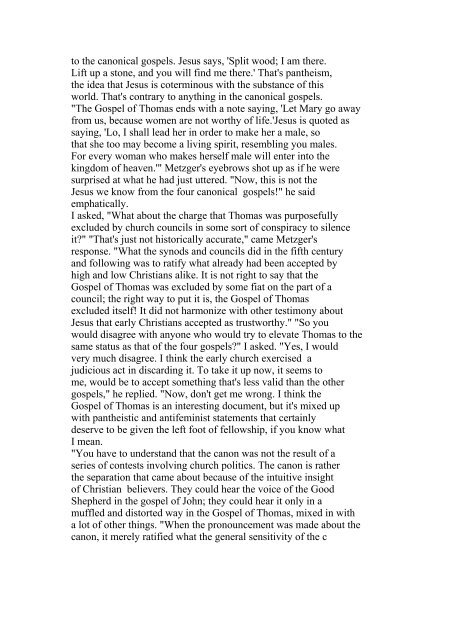The Case For Christ
The Case for Christ records Lee Strobel's attempt to "determine if there's credible evidence that Jesus of Nazareth really is the Son of God." The book consists primarily of interviews between Strobel (a former legal editor at the Chicago Tribune) and biblical scholars such as Bruce Metzger. Each interview is based on a simple question, concerning historical evidence (for example, "Can the Biographies of Jesus Be Trusted?"), scientific evidence, ("Does Archaeology Confirm or Contradict Jesus' Biographies?"), and "psychiatric evidence" ("Was Jesus Crazy When He Claimed to Be the Son of God?"). Together, these interviews compose a case brief defending Jesus' divinity, and urging readers to reach a verdict of their own.
The Case for Christ records Lee Strobel's attempt to "determine if there's credible evidence that Jesus of Nazareth really is the Son of God." The book consists primarily of interviews between Strobel (a former legal editor at the Chicago Tribune) and biblical scholars such as Bruce Metzger. Each interview is based on a simple question, concerning historical evidence (for example, "Can the Biographies of Jesus Be Trusted?"), scientific evidence, ("Does Archaeology Confirm or Contradict Jesus' Biographies?"), and "psychiatric evidence" ("Was Jesus Crazy When He Claimed to Be the Son of God?"). Together, these interviews compose a case brief defending Jesus' divinity, and urging readers to reach a verdict of their own.
Create successful ePaper yourself
Turn your PDF publications into a flip-book with our unique Google optimized e-Paper software.
to the canonical gospels. Jesus says, 'Split wood; I am there.<br />
Lift up a stone, and you will find me there.' That's pantheism,<br />
the idea that Jesus is coterminous with the substance of this<br />
world. That's contrary to anything in the canonical gospels.<br />
"<strong>The</strong> Gospel of Thomas ends with a note saying, 'Let Mary go away<br />
from us, because women are not worthy of life.'Jesus is quoted as<br />
saying, 'Lo, I shall lead her in order to make her a male, so<br />
that she too may become a living spirit, resembling you males.<br />
<strong>For</strong> every woman who makes herself male will enter into the<br />
kingdom of heaven.'" Metzger's eyebrows shot up as if he were<br />
surprised at what he had just uttered. "Now, this is not the<br />
Jesus we know from the four canonical gospels!" he said<br />
emphatically.<br />
I asked, "What about the charge that Thomas was purposefully<br />
excluded by church councils in some sort of conspiracy to silence<br />
it?" "That's just not historically accurate," came Metzger's<br />
response. "What the synods and councils did in the fifth century<br />
and following was to ratify what already had been accepted by<br />
high and low <strong>Christ</strong>ians alike. It is not right to say that the<br />
Gospel of Thomas was excluded by some fiat on the part of a<br />
council; the right way to put it is, the Gospel of Thomas<br />
excluded itself! It did not harmonize with other testimony about<br />
Jesus that early <strong>Christ</strong>ians accepted as trustworthy." "So you<br />
would disagree with anyone who would try to elevate Thomas to the<br />
same status as that of the four gospels?" I asked. "Yes, I would<br />
very much disagree. I think the early church exercised a<br />
judicious act in discarding it. To take it up now, it seems to<br />
me, would be to accept something that's less valid than the other<br />
gospels," he replied. "Now, don't get me wrong. I think the<br />
Gospel of Thomas is an interesting document, but it's mixed up<br />
with pantheistic and antifeminist statements that certainly<br />
deserve to be given the left foot of fellowship, if you know what<br />
I mean.<br />
"You have to understand that the canon was not the result of a<br />
series of contests involving church politics. <strong>The</strong> canon is rather<br />
the separation that came about because of the intuitive insight<br />
of <strong>Christ</strong>ian believers. <strong>The</strong>y could hear the voice of the Good<br />
Shepherd in the gospel of John; they could hear it only in a<br />
muffled and distorted way in the Gospel of Thomas, mixed in with<br />
a lot of other things. "When the pronouncement was made about the<br />
canon, it merely ratified what the general sensitivity of the c

















